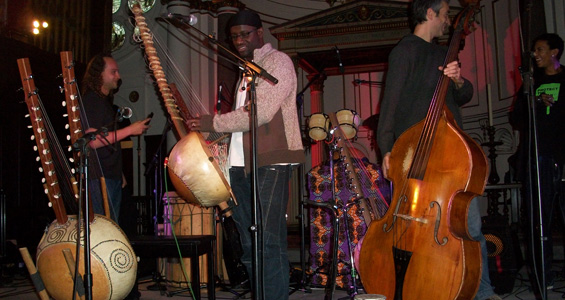Staying in tune with the planet
The African musicians making a noise about climate change and individual responsibility.

 |
| The Seckou Keita Quintet say it is worth trying to cut their carbon footprint by using public transport as much as possible, despite almost missing the last train after a UK gig |
Keep reading
list of 4 itemsTurtles swimming to extinction in Malaysia as male hatchlings feel heat
Could shipping containers be the answer to Ghana’s housing crisis?
Thousands protest against over-tourism in Spain’s Canary Islands
Drought for a fifth year running is driving more than 23 million East Africans in seven countries towards severe hunger and destitution, and climate change threatens to worsen the situation in the coming years.
It is a stark picture not lost on the African musician Seckou Keita, whose music is inspired by nature.
He is fighting the effects of climate change and helping East Africa with a new environmental policy for his band – touring the UK with as small a carbon footprint as possible.
Brighton is an English seaside town that does not seem to suffer from climate change.
When African musician, Seckou Keita, arrives for a concert here the usual English rain has cleared and the sky is bright. People are enjoying the breeze, eating chips and walking their dogs along the beach.
It is a long way from East Africa, where extreme weather conditions and terrible drought has killed livestock and left 23 million people facing starvation.
But Seckou’s concert in Brighton is giving a helping hand to these people – and fighting climate change at the same time.
The Seckou Keita Quintet have an environmental policy which has cut their promotional material by half and means the band use public transport wherever possible – offsetting carbon emissions by sponsoring environmental schemes in East Africa.
The last tour invested in tree planting; this UK tour is sponsoring energy efficient cooking stoves in Kenya, to replace open fire cooking.
Offsetting carbon
Chelima Sade, the bands manager, put the policy together: “I don’t think we’re doing enough to take stock of this wonderful living earth – we need to look to the future or our activity will have a disastrous effect. I have a young son and my activity will have an impact on him – it scares me.
“As travelling artists we use a lot of carbon. On tour we now use as much public transport as possible and when we do drive the van or fly, we offset out carbon footprint by using a company called Carbon 2 Balance. It’s not ideal, just giving a lump sum of money, but it’s the best we can do now.
 |
| Many Kenyans face starvation after rains failed for five consecutive years [Save the Children] |
“We’ve also cut our printing of promotional material and have a much bigger digital presence instead – using Facebook, My Space and the website.
“Two years ago I was putting out 600 CDs to promoters, 6,000 letters all over the world. Now we’ve stopped the newsletter – I just send an email. What paper we do use is from sustainable forests,” she says.
Seckou Keita is known as the Jimi Hendrix of the kora. The kora is a traditional African instrument made of gourd with strings attached – like a big exotic banjo – which he has been playing since he was a child.
Seckou has several of different sizes and works hard to tune them all up before the concert.
It is the kora and his childhood in Africa which inspired Seckou to fight for the environment.
“I’ve been bought up in Senegal on a farm where we cared for nature. And the instrument I play is organic – made out of gourd. When I began touring, travelling and using petrol, I didn’t know about my carbon footprint.
“This tour was a big opportunity to do something. I was happy to try and help the environment – and be able to produce more koras for the world,” he says.
It is not easy to reduce the carbon the band uses, especially when there are trains to catch at the end of a concert.
In Brighton, the crowd shouts and stamps for an encore. Seckou smiles widely and enjoys playing another final song but Samy Bishai, the band’s violinist, and Davide, the bassist, grow stressed. They have to get to the station in time to catch the last train to London.
Individual responsibility
They just make it, running through the closing train doors. Sitting down safely in their seats, they both think the band’s environmental policy is worth the extra hassle.
“The only way to change the world is to actively monitor yourself and attempt to change the way you do things – if everyone actually takes that responsibility on themselves – then perhaps some large scale change will be implemented,” says Samy.
But as a touring band they do use more then the average person’s amount of carbon. Since 2004 the quintet has undertaken 400 concerts in 25 countries and five continents.
So what is more important – getting their music heard or saving the environment?
“It’s a conundrum. A lot of musicians are turning down festivals or one-off gigs in Europe if it means flying because they say it’s against their principals. And starving bands don’t turn down gigs for a pose.
“High profile bands can turn refusing gigs to their advantage. They post on their Facebook pages and their blogs that they’ve had to cancel their gig because they can’t find an environmental way to get to the venue. Fans are gutted but they appreciate that their idols are making a commitment.
“Bands such as ourselves, who tour for a living, we do what we can. As well as donating to carbon emission charities we switch off lights in hotel rooms and we don’t throw bottles away,” says Samy.
Seckou agrees that it is a dilemma, but firmly believes the message the band is sending out with their music and their environmental policy is an important one – for other musicians and the people who love their music.
“It’s a hard balance, a very hard balance. Flying and doing those tours is a way of reaching people and promoting what you do and what you say. You need those elements like planes and buses and trains. But I have a lot of hope that I am sending a message,” he says.
“Maybe one day we won’t be able to travel like this and we will have another way to spread our message. If there was a way to communicate with all those people without taking a plane I would do that … this is a message to all my fellow musicians.”